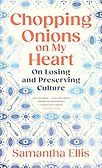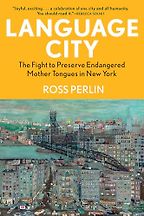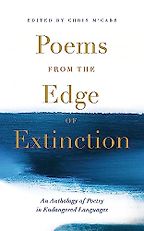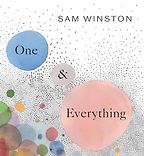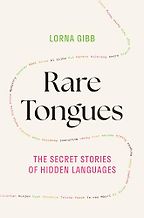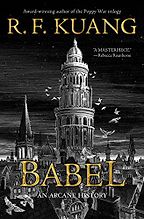Thank you for recommending these five books on endangered languages. Perhaps you’d begin by telling us a little bit about why you are interested in this subject.
I grew up with an endangered language as my mother tongue. Or, at least, the language that my parents speak and spoke to me as a child. The idea of a ‘mother tongue’ is argued over by linguists—some people say it’s the first language you speak, some say it’s the language your mother speaks to you. The Moroccan author and translator Ghita el Khayat has this idea of a ‘milk language,’ that you take in along with your milk.
So I grew up listening to and trying to speak Judaeo-Iraqi Arabic, the language of my community, the Iraqi Jews. And I’ve always been drawn to learning about other endangered languages as a result.
I read a statistic that suggested that around half of the 7000 languages spoken today will be extinct by the end of this century. Why is it important to preserve these languages?
Well, many people think it isn’t. But I think it is.
A lot of the arguments made are for knowledge. For example, languages might have names for things that encode their uses. So it’s possible there could be cures for illnesses that we don’t know about because they are named in languages that have not been translated. That’s an argument a lot of people use.
Others talk about diversity in general, which I think is a huge argument. I mean, I would like to have the cures, but I also don’t like the idea of stripping languages for parts and only using what’s useful. I think that the more languages the better, the more diversity of expression the better.
“Out of 7000 languages on the planet, 700 of them can be found in New York, and many of those are endangered”
It’s also, I think, really important for the speakers of those languages. There was a famous Canadian study that showed that young indigenous people who learned to speak their ancestral languages were much less likely to commit suicide. It’s really important for people to connect to the languages spoken in our families and communities, even if we might not be fluent.
I also feel negative about the flattening out of culture that happens with languages funnelling and narrowing down. There are so few that are now used in the world.
I can see how, if you are part of a minority community within a larger culture, it might be a strategic decision to teach your child to speak the more common tongue. But that must have an erosive effect, culturally speaking.
Absolutely. And with language go stories. Yes, you can translate those stories and tell them in a different language, but there is often something vibrant lost. With a language goes a sort of vibe, a style, a mode of speaking. So I do think it quite devastating that so many languages will be lost.
Shall we look at your recommended books on endangered languages? Let’s begin with Language City by Ross Perlin.
This is a wonderful book that is completely unlike all other books about endangered languages. Ross Perlin works at the Endangered Language Alliance in New York city, which is working to reclaim, revitalise and preserve languages. They are not interested in mourning or lamenting.
So many of these books are about tracking down the last speaker, and, when you finally find them, they can only say one word and no one knows what it means. But if you read Perlin’s book, it’s full of life. It’s radical. It’s exciting.
Out of those 7000 on the planet, 700 of them can be found in New York, and many of those are endangered, because this is where refugees have ended up. He describes an apartment block-which he calls ‘a vertical village’-where 100 people speak Seke, a language from Nepal. There are only 700 speakers of Seke worldwide. These 100 speakers are in New York, they’ve been transplanted, but they are keeping it alive.
He talks about Lenape, the language spoken in Manhattan before it was settled. He says that there would be a sort of magical justice if New Yorkers were all suddenly speaking Lenape. It’s a book that’s full of humour. At one point, the wonderful woman who is trying to keep Lenape alive gets a parking ticket and she jokes that maybe she should say: It’s my ancestral land, I’m not going to pay it. I love that.
I love the whole approach to keeping it alive, speaking it, connecting through it, and just enjoying the richness of it. He describes walking down the street in the borough of Queens, and just how many languages he hears in a short walk. Someone needs to do this for London.
Your description of the apartment block makes me think of how different plant species, which might not be particularly numerous in their home environment, can spread sometimes into a new place and go wild. There’s always potential.
It’s very positive in that way. This is a book about movement and migration, transplantation and displacement. It’s an exciting, optimistic book about endangered languages.
Your second book recommendation is Poems from the Edge of Extinction, edited by Chris McCabe. It gathers together 50 poems in languages from around the world.
I just love this book. These languages have hardly any speakers, but some of them have poets—multiple poets. I think that’s an amazing testament to how much people love these languages. They might not even speak it fluently, but they are writing poetry in it.
The diversity of languages covered in this book is extraordinary, from African languages like Bubi to European languages like Basque. There’s Yiddish, Welsh, Scottish Gaelic, Scots—Jackie Kay has got a love poem. Middle Eastern languages like Assyrian. Maori. It’s just an extraordinary glimpse into the different ways people are using language in creative ways around the planet.
Again, rather than read about how sad it is that these languages could be lost, it’s exciting to read a poem in one of them, then a translation. One of them, in the South Arabian language Bathari—which is spoken in Oman—is about someone turning up in the night in search of news. At the end it says:
For we are doing perfectly well / And are in excellent health
There was something about that—that assertion of creativity and competence and boldness—that was quite exhilarating.
I was interested to read in your book of how much of Yiddish has been preserved thanks to its its very strong publishing tradition. And in my home country, Scotland, we have a number of dialects, but the Gaelic language has found recent resurgence in primary school education—many children, including my own niece and nephew, have become fluent after the language skipped several generations. It’s interesting how languages might bubble up again unexpectedly.
Absolutely. In my book I discuss how languages that have been dead for years can spring back to life. You find the Rosetta Stone, and suddenly you’re translating hieroglyphs. Suddenly we knew what ancient Egyptians were saying to each other! Similarly, with Akkadian, an Iraqi language that was silent for millennia, we suddenly had the Epic of Gilgamesh, which is a great foundational myth and an amazing story that we had lost for so long.
Ross Perlin says you can be a ‘keeper’ as well as a ‘speaker’—that you might do something that could allow future generations to speak. You might be an archivist of your own language and stories, and keep them for the next generation.
Your next book recommendation takes an interesting approach to the subject of endangered languages. Tell me about One & Everything by Sam Winston. It’s very beautiful.
Yes, it’s a picture book. It’s really more about endangered alphabets than endangered languages, but some of these alphabets are from endangered languages. One story swallows all the others, but the others can still be found within this one story. I thought that was very powerful.
English is a magpie language. We borrow from so many different languages, including Arabic and Yiddish. All these words have filtered into English. Sam Winston uses 50 scripts to illustrate his book, including cuneiform. So it’s really lovely.
I bought it to read to my son when he was about six. I wanted to explain what an endangered language was—how his grandparents speak a language that will be dead by the time he grows up. So I bought this picture book, and we found it really helpful.
Judaeo-Iraqi Arabic is an interesting example, because I believe it has been recorded via a number of different alphabets.
Yes. When my son was about two, I was talking to a French mother in a playground. She said she was bringing up her child bilingual. I said I wanted to send my son to the French nursery down the road, because it would be nice for him to be bilingual too. She said: But you’re not French! Why don’t you send him to a nursery for your language? I found myself saying that my language was dead, then I absolutely burst into tears. For years I couldn’t go back to that playground, because I really did make a bit of a scene.
After that, I started researching. Everyone originally told me that Judaeo-Iraqi Arabic is always written in Hebrew. This made no sense to me, because my grandmother, who was then in her nineties, didn’t read or speak Hebrew. So how could she be writing it?
Five Books interviews are expensive to produce. If you're enjoying this interview, please support us by donating a small amount.
It seems that, originally, it was written in the Hebrew alphabet but, later on, women who were writing didn’t necessarily have the religious education in Iraq, so they were writing in the alphabet they used the rest of the time—the Arabic script. Then, as people became more secular, more people wrote in Arabic.
But it wasn’t written down much; it was mainly an oral language. When Iraqi Jewish writers wrote books, they wrote it either in fusha, which is classical Arabic, or in the languages where they ended up. So there are lots of books by Iraqi Jews in French and English and Hebrew.
If you are in a small language group, you are almost by definition going to be absorbing and changing and moving. That’s what your language will do with you. It adapts to your life.
My family in Iraq were always code switching. They’d leave the house and go straight into the Muslim Arabic, the Iraqi Arabic that was more generally spoken. And then if they were writing or reading textbooks at school, they would be using Modern Standard Arabic. Then They’d come home and go straight into the Jewish dialect.
Some people call it a language, others a dialect. I think in a small language you are always absorbing words, but there’s a beautiful reason for that—which is that everyone is talking to everyone else. I think we get quite fixated on whether something is a language or a dialect. You know—the purity of a language. But actually we are always borrowing words from other languages all the time and from other people. Even in this conversation I will have heard something you say—a turn of phrase—and a few days later I will probably use it, and vice versa. That’s how language works.
Certainly, in Iraq, everyone was speaking to everyone else and all the languages borrowed from each other. The Jews came to Iraq in 597 BCE, and they were speaking Hebrew. They switched to the local language, Aramaic, but they carried over all these Hebrew constructions and words. Then, when the Arab Conquest came, everyone switched to Arabic, but again they carried over a lot of Aramaic and Hebrew constructions and kept them.
That’s interesting. The same thing is true in Scotland—most people don’t speak Gaelic in the part of the Highlands where I’m from, but you can still hear echoes of it in the way local people construct sentences in English. I didn’t realise that until I went to some beginner Gaelic lessons. Shall I move us on to Rare Tongues by Lorna Gibb?
She’s a Scottish linguist! She started writing this book in London, then the pandemic happened, and she moved back to Scotland. She describes how her accent grew stronger and she relearned words she hadn’t used for a long time because English friends and colleagues couldn’t understand them. Like: dreich, is it?
Yes, dreich, meaning dull, overcast.
Yes. And ‘chapping’ the doors instead of knocking on them. So she describes how the process of writing this book about rare tongues, these endangered languages, was enriched by her return to Scotland and her Scottish roots. I think it would be a much less powerful book if she’d written the whole thing in London.
But her book is quite wide-ranging. She’s talking about whistling languages in the Canary Islands, she’s talking about New Zealand, Sri Lanka, all over the world.
What would you say her purpose is, what’s her thesis?
She’s exploring the complexity and diversity and richness of languages. There are short chapters on all sorts of things like language ecosystems, all the different sign languages from around the world, all the different whistling and click languages. You get a sense of the amazing chatter of the world. I found it quite powerful.
Thank you so much. Your final recommendation is a novel. This is R.F. Kuang’s Babel, which is a dark academia fantasy novel in which translation is used for imperial ends. What did you take form it?
Well, I wasn’t sure this would be allowed. It’s a brilliant novel about an alt-reality Victorian England where translation has actual power. If you find these pairs of words that almost mean the same thing but not quite, you can inscribe them on silver bars, and they generate energy. These silver bars are used to power industry. So the British Empire is bringing linguists from all the colonised countries, from the most far-flung places, but then these linguists rebel.
One of the things they do in the rebel stronghold is talk about how a great extinction event began on the day Christopher Columbus set foot in the new world. Since then, languages have been dying. Diversity of languages is essential to the running of this empire, but yet it is grinding them out.
There was something so powerful in how, in this fantasy novel, in this unlikely setting, she captures something incredible about what we are losing. Obviously we are not trying to power our empire with silver bars, but we are losing a richness.
There’s an amazing scene where all the rebel linguists are in Oxford. These people speak everything and love languages—they have mad combinations of languages that no one but a linguist would have learned. And that love of real, arcane languages has brought them together, and in fact is what makes them start a revolution. It’s a deceptively fun book.
I like that—linguistic diversity as a non-renewable resource. And the monolingual empire draining the energy from other cultures.
In linguistics there has been an anxiety about borrowing too many metaphors from the natural world. The linguists Aidan Pine and Mark Turin argued that, if you start talking about endangered languages in the way we talk about endangered species, it can imply an agentless process where it’s natural that things are dying out. But things don’t just die out. People don’t wake up one day and decide to speak a dominant language. There is usually a lot of violence and displacement in the stories of these languages becoming endangered.
Do you think writing your own book on the subject has brought you to a new acceptance or understanding of this process?
Certainly. I found writing the book incredibly emotional and difficult at times because I thought I was just going to write about language, but I ended up writing a lot more about the other things we let go of, or are taken away, and the decisions we do and don’t make about the culture we hang onto. So it became a bigger book, but I found the process of learning about what has been lost and what is being lost very connecting, very healing. I found this idea that I could be a ‘keeper.’ It really helped me, this idea, because I very fixated on being a speaker, on getting the language back as an adult. But, actually, if I can talk about the language and culture, and pass that on, that might be my role. And that might be worth doing.
Interview by Cal Flyn, Deputy Editor
July 1, 2025
Five Books aims to keep its book recommendations and interviews up to date. If you are the interviewee and would like to update your choice of books (or even just what you say about them) please email us at [email protected]

